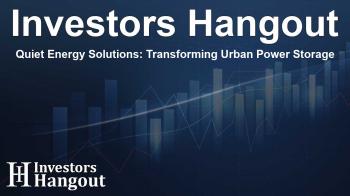Quiet Energy Solutions: Transforming Urban Power Storage

Quiet Energy Solutions: Transforming Urban Power Storage
As the world shifts towards renewable energy, energy storage becomes essential in balancing generation, grid demands, and enhancing flexibility. However, deploying these systems in urban areas presents unique challenges, particularly regarding noise control. This concern significantly influences both the success of energy projects and local community acceptance.
Envision Energy: Champion of Noise-Free Solutions
In response to rising expectations, Envision Energy has risen as a leader in sustainable technology, developing solutions that prioritize quiet operation. Such advancements are particularly crucial when energy storage systems are positioned close to residential neighborhoods. A case study in Stockport demonstrates how effective noise control can facilitate community trust.
Understanding Community Concerns
When energy facilities are sited near residential areas, the inevitable question arises—will they disturb daily life? This challenge goes beyond technical feasibility. It determines project approvals, ongoing community support, and compliance with environmental regulations.
The Challenges of Urban Energy Storage
Positioned near housing estates, energy storage systems often find themselves scarily close to homes. In regions across Europe and the United States, the proximity to residential space poses strict operational limits. Any noise exceeding acceptable levels can lead to immediate complaints, jeopardizing the project's future.
Innovation in Noise Reduction
Envision tackled these concerns head-on by testing their energy storage system under critical conditions. They operated the system at full capacity during the quietest hours, typically when community disturbance would be at its highest risk. Remarkably, the noise produced by their system was about 5 decibels (dB) quieter than the ambient noise of the area, allowing their technology to blend harmoniously with the environment.
Key Technologies for Achieving Silence
Noise reduction is not merely an add-on but a fundamental aspect of Envision’s design philosophy. Many traditional energy storage solutions face challenges with high noise output, especially within AC systems, which often operate at levels comparable to a vacuum cleaner. In contrast, Envision developed a system that not only complies with rigorous noise standards but excels in performance.
Understanding AC vs. DC Systems
In general, direct current (DC) systems are quieter than alternating current (AC) systems. This variance stems from differences in how heat is generated and managed. AC systems, particularly the power conversion system (PCS), typically generate higher noise levels. Notably, the noise performance of the PCS influences the entire site's sound profile, making it a focal point for any noise control approach.
Groundbreaking Achievements in Silence
Envision's independent testing unveiled impressive results, demonstrating that their AC storage systems operate below 58.5 dBA, significantly lower than many competitors. This reduced level translates to perceived silence for residents working and living near these facilities.
The Science of Achieving Quiet Operation
Ultimately, Envision’s innovative approach derives from years of experience in optimizing thermal management and environmental controls. They employ advanced integrated designs and specialized technologies to suppress noise, including unique equipment designed for noise reduction and an intelligent cooling system that mitigates fan sounds.
This strategic focus on quieter operations enables Envision to deploy energy storage systems effectively in urban settings, aligning with the broader goal of establishing user-friendly power solutions. Their commitment not only addresses the practical needs of communities but also enriches regional energy resilience.
Frequently Asked Questions
What is Envision Energy's strategy for noise control?
Envision Energy focuses on developing technologies that minimize operational noise, making their energy storage solutions more acceptable for urban deployments.
How do energy storage systems affect nearby communities?
The proximity of energy systems to residential areas can raise concerns about noise and disturbance, making effective noise control essential for community acceptance.
Why is noise reduction important in energy systems?
Noise reduction is crucial for gaining community support and complying with environmental regulations, which can determine the viability of energy projects.
What unique technologies does Envision use in their systems?
Envision utilizes innovative cooling systems, specially designed components for noise suppression, and advanced integrated designs to minimize sound output.
What is the importance of community feedback in energy projects?
Community feedback helps ensure that energy projects meet local needs and expectations, fostering trust and support for sustainable energy initiatives.
About The Author
Contact Dominic Sanders privately here. Or send an email with ATTN: Dominic Sanders as the subject to contact@investorshangout.com.
About Investors Hangout
Investors Hangout is a leading online stock forum for financial discussion and learning, offering a wide range of free tools and resources. It draws in traders of all levels, who exchange market knowledge, investigate trading tactics, and keep an eye on industry developments in real time. Featuring financial articles, stock message boards, quotes, charts, company profiles, and live news updates. Through cooperative learning and a wealth of informational resources, it helps users from novices creating their first portfolios to experts honing their techniques. Join Investors Hangout today: https://investorshangout.com/
The content of this article is based on factual, publicly available information and does not represent legal, financial, or investment advice. Investors Hangout does not offer financial advice, and the author is not a licensed financial advisor. Consult a qualified advisor before making any financial or investment decisions based on this article. This article should not be considered advice to purchase, sell, or hold any securities or other investments. If any of the material provided here is inaccurate, please contact us for corrections.

